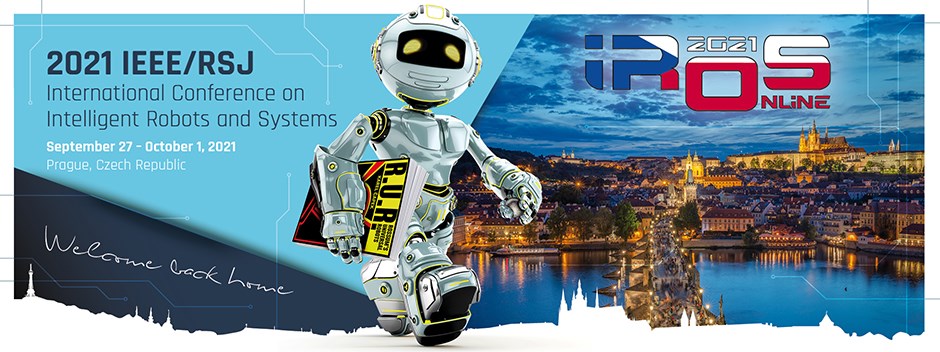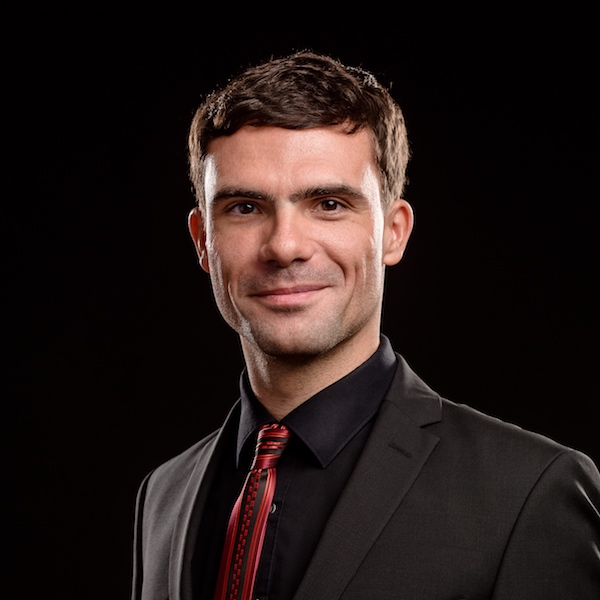IROS Workshop 2021

4th Ergonomic Human-Robot Collaboration: Applications and Future Research
Friday, October 1st, 2021
NOTIFICATION
We invite you to join the live sessions of IROS 2021 Workshop on "4th Ergonomic Human-Robot Collaboration: Applications and Future Research":
* Time: 16.10 - 18.10 (UTC+2), 1st of October, 2021, Friday
* At least The WORKSHOPS & TUTORIALS registrations required.
Work-related musculoskeletal disorders (WMSD) often plague productivity of workers and negatively affect their living standards. The loss of productivity comes at the expense of competitiveness of companies and high healthcare costs associated with treatment of WMSD. These issues often arise from workers being exposed to various common risk factors during the physical work, such as improper working posture, repetitive high load, mechanical compression, vibration, etc. The experimental techniques to confront these issues are mainly based on heuristic strategies and ergonomic guidelines to work in such a way to reduce or eliminate the risk factors related to WMSD. However, these are mostly designed human workers only and often do not account for collaborative robots (cobots) or wearable assistive systems of the modern industry. Therefore, new methods have to be developed that effectively associate the ergonomics monitoring and risk elimination techniques to Human-Robot Collaboration (HRC). For example, cobots should be aware of the human worker's states and predict his/her actions and use physical or non-physical actions to improve the working conditions in an online manner.
Some methods have been recently developed, in part, thanks to a string of successful workshops on this topic that were organised by our team in the past. We organised the first workshop of this series at ICRA 2018 to introduce the field of ergonomic human-robot collaboration. We then followed up with a workshop at IROS 2019 to review the initial research progress based on the goals set at the first workshop and to identify major ongoing research problems. Finally, we continued with a workshop at IROS 2020 to discuss the emerging research opportunities and challenges. Now comes the time to discuss the potential applications and implications in real-world scenarios.
The proposed workshop will first review the progress of the research and development in ergonomic human-robot collaboration that was achieved since the last workshop at IROS 2020. In particular, we will try to reflect on whether the identified challenges were resolved and the identified opportunities were capitalised on. We will then focus on identifying the main real-world applications where the methods can be effectively applied, and discuss and devise the strategies to facilitate the identified applications. In addition, we will discuss potential novel research directions, ergonomic metric and robot control methods. This agenda requires experts from various research fields and interdisciplinary discussion. For this purpose, we assembled a diverse set of organizers and speakers, who are leading experts in their respective areas that are highly relevant to this workshop topic.
The questions we want to address
-
How to clearly define the measures for ergonomics in human-robot collaboration? - How to design the appropriate optimization that the robot controller can use?
- Are the proposed ergonomic measures sufficient to ensure ergonomic conditions and prevent work-related injuries in terms of bio-medical aspects?
- How to improve the existing modelling of the human and effectively apply it to achieve ergonomic human-robot collaboration?
- Learning algorithms may help the robot to overcome some of the above-mentioned issues.
- What kind of additional sensory feedback systems are required?
- How can robot learning methods be utilized to this end? What are the challenges in achieving the proposed goal in different applications (i.e. industrial human-robot collaboration, wearable robots, service robots, etc.)?
Conclusions
- Software for simulating, planning, and predicting a shared manufacturing workspace can be very useful to ensure correct task scheduling and agent allocation in human-robot manufacturing.
- Cognitive ergonomics-related problems (e.g., mental stress, etc.) will become more relevant in future when robots take most of the physical aspects away from humans.
- We need to strike a good tradeoff between productivity and stress. Game theory based methods can control this tradeoff.
- We need to strike a good tradeoff between involvement and stress. If we involve the human too much, it will stress him/her. If we remove him/her from the task too much, they will feel “useless” or “bored”.
- Collaborative robots should be equipped with human biomechanical models in order to optimize and adjust the collaborative task execution.
- Reconfiguring haptic devices during teleoperation can improve human operator’s working postures. In tele-impedance, commanding low remote robot impedance can improve execution of force-level tasks.
- Back pain due to improper working conditions is very common. Exoskeletons can be a very useful solution to this problem for tasks that involve heavy lifting and carrying. However, exoskeletons can take a lot of space to wear and time to equip, and can also add other negative aspects, such as increased sweating, etc.
- Workers might be reluctant to use exoskeletons, therefore a proper motivation and communication strategies are critical to promote acceptance.
- Mechanical design of exoskeleton plays an important role in ergonomics and its acceptance. Light passive exoskeletons can be a good alternative to bulky active exoskeletons.
- Field studies are crucial to accelerate the application of ergonomic human-robot collaboration and exoskeleton systems.
- We need learning algorithms that work in real-time and continuously.
- While we do our best to prevent injuries to the human musculoskeletal system, they will still happen from time to time. Therefore, we need effective robotic physiotherapy/rehabilitation systems that can sense humans and perform safe physical guidance.
- Physiotherapy/rehabilitation systems should use feedback from biomechanical models to ensure safe, fast, and more complete recoveries. However, models have to be personalized correctly to be effective.
- In some cases injuries require use of a prosthesis to replace the lost limbs and restore functions. The control of the prosthesis should use predictive machine learning systems to account for ergonomics.
Interests
Physical Human-Robot Collaboration, Occupational Ergonomics, Human Modelling, Physical Interaction Control, Adaptation and Learning, Industrial Robots, Exoskeleton Robots, Wearable Sensors, Feedback Devices, Shared Control.
Schedule
| Time (CEST, UTC+2) | Title | Speaker(s) |
|---|---|---|
| 16.10 – 16.25 | Introduction by the organizers | Luka Peternel, Wansoo Kim, Arash Ajoudani, Eiichi Yoshida |
| 16.25 – 16.40 | Physiological aspects of human-robot collaboration | Andrea Zanchettin |
| 16.40 – 16.55 | Machine learning for environment-aware ergonomic control in assistive robots | Heni Ben Amor |
| 16.55 – 17.10 | The importance of a user-centered approach and the challenge behind exoskeleton implementation | Saskia Baltrusch |
| 17.10 – 17.25 | Design of a new actuated exoskeleton for back support for workers | Herman van der Kooij |
| 17.25 – 17.40 | Training with an Industrial Robot: Current Directions to Personalize Neuromuscular Training | Kirsten Albracht |
| 17.40 – 17.55 | Simulation and validation of HRC work systems with 3D human modeling | Lars Fritzsche |
| 17.55 – 18.10 | Summary session | Luka Peternel, Wansoo Kim, Arash Ajoudani, Eiichi Yoshida |
Organizers
Luka Peternel, Assistant Professor
Delft University of Technology, Netherlands
e-mail: This email address is being protected from spambots. You need JavaScript enabled to view it.
Luka Peternel received a Ph.D. in robotics from Faculty of Electrical Engineering, University of Ljubljana, Slovenia in 2015. He conducted Ph.D. studies at Department of Automation, Biocybernetics and Robotics, Jožef Stefan Institute in Ljubljana from 2011 to 2015, and at Department of Brain-Robot Interface, ATR Computational Neuroscience Laboratories in Kyoto, Japan in 2013 and 2014. He was with Human-Robot Interfaces and Physical Interaction Lab, Advanced Robotics, Italian Institute of Technology in Genoa, Italy from 2015 to 2018. From 2019, Luka Peternel is an Assistant Professor at Department of Cognitive Robotics, Delft University of Technology in the Netherlands.
Wansoo Kim, Assistant Professor
Hanyang University, Republic of Korea
e-mail: This email address is being protected from spambots. You need JavaScript enabled to view it.
Wansoo Kim is an assistant professor at Hanyang University ERICA, Republic of Korea. He received the B.S. degree in mechanical engineering from Hanyang University, Korea in 2008 and a Ph.D. degree in mechanical engineering from Hanyang University, Korea in 2015 (Integrated MS/PhD program). He was with Human-Robot Interfaces and Physical Interaction Lab, Italian Institute of Technology in Genoa, Italy from 2016 to 2020. He has developed several exoskeleton systems such as HEXAR-Hanyang Exoskeleton Assistive Robot, and conducted research on the control of the powered exoskeleton robot through the physical human-robot interaction (pHRI) forces. He is currently involved in a project Horizon-2020 project SOPHIA. He has contributed to several projects in the field of exoskeleton robot in Korea projects (High responsive control technology of a lower-limb exoskeleton under rough terrain-1415144732, Development of Wearable Robot for Industrial Labor Support-1415135223, etc.), and joint R&D projects with a company (DSME and LIG Nex1). He was the winner of the Solution Award 2019 (Premio Innovazione Robotica at MECSPE2019), the winner of the KUKA Innovation Award 2018, the winner of the HYU best PhD paper award 2015, and the winner of the ICCAS best presentation award 2014. His research interests are in Physical human-robot interaction (pHRI), human-robot collaboration, Shared Control, Ergonomics, Human modelling, Feedback devices, and powered exoskeleton robot.
Arash Ajoudani, Principal Investigator
Italian Institute of Technology, Italy
e-mail: This email address is being protected from spambots. You need JavaScript enabled to view it.
Arash Ajoudani received his PhD degree in Robotics and Automation from Centro "E Piaggio", University of Pisa, and Advanced Robotics Department (ADVR), Italian Institute of Technology (IIT), Italy (July 2014). His PhD thesis was a finalist for the Georges Giralt PhD award 2015 - best European PhD thesis award in robotics. He is currently a tenure-track scientist and the leader of the Human-Robot Interfaces and Physical Interaction (HRI2) lab of the IIT. He was a winner of the Amazon Research Awards 2019, the winner of the Werob best poster award 2018, winner of the KUKA Innovation Award 2018, a finalist for the best conference paper award at Humanoids 2018, a finalist for the best interactive paper award at Humanoids 2016, a finalist for the best oral presentation award at Automatica (SIDRA) 2014, the winner of the best student paper award and a finalist for the best conference paper award at ROBIO 2013, and a finalist for the best manipulation paper award at ICRA 2012. He is the author of the book "Transferring Human Impedance Regulation Skills to Robots" in the Springer Tracts in Advanced Robotics (STAR), and several publications in journals, international conferences, and book chapters. He is currently serving as the executive manager of the IEEE-RAS Young Reviewers' Program (YRP), chair and representative of the IEEE-RAS Young Professionals Committee, and co-chair of the IEEE-RAS Member Services Committee. He has been serving as a member of scientific advisory committee and as an associate editor for several international journals and conferences such as IEEE RAL, Biorob, ICORR, etc. His main research interests are in physical human-robot interaction and cooperation, robotic manipulation, robust and adaptive control, rehabilitation robotics, and tele-robotics.
Eiichi Yoshida, Co-Director
National Institute of Advanced Industrial Science and Technology (AIST), Japan
e-mail: This email address is being protected from spambots. You need JavaScript enabled to view it.
Eiichi Yoshida received M.E and Ph. D degrees on Precision Machinery Engineering from Graduate School of Engineering, the University of Tokyo in 1993 and 1996 respectively. In 1996 he joined former Mechanical Engineering Laboratory, later reorganized as National Institute of Advanced Industrial Science and Technology (AIST), Tsukuba, Japan. He served as Co-Director of AIST/IS-CNRS/ST2I Joint French-Japanese Robotics Laboratory (JRL) at LAAS-CNRS, Toulouse, France, from 2004 to 2008. Since 2009, he has been serving as Co-Director of CNRS-AIST JRL (Joint Robotics Laboratory), IRL at Tsukuba, Japan, and appointed as Director since 2017 to date. He also served as Deputy Director of Intelligent Systems Research Institute (IS-AIST) from 2015 to 2018 and as Director of Planning Office, Department of Information Technology and Human Factors from 2018 to 2020, at AIST. He is currently Deputy Director of Industrial Cyber-Physical Systems Research Center, and TICO-AIST Cooperative Research Laboratory for Advanced Logistics in AIST. He was awarded Chevalier, l’Ordre National du Mérite from French Government in 2016 for his long-term contributions to French-Japanese collaboration on robotics. He is IEEE Fellow, and member of RSJ and JSME. His research interests include robot task and motion planning, human modeling, humanoid robots and advanced logistics technology.
Invited Speakers
-
Prof. Kirsten Albracht
German Sport University Cologne, Germany“Training with an Industrial Robot: Current Directions to Personalize Neuromuscular Training”
-
Prof. Heni Ben Amor
Arizona State University, USA"Machine learning for environment-aware ergonomic control in assistive robots"
-
Saskia Baltrusch
TNO Dept., The Netherlands"The importance of a user-centered approach and the challenge behind exoskeleton implementation"
-
Prof. Dr. Lars Fritzsche
imk automotive GmbH, Germany"Simulation and validation of HRC work systems with 3D human modeling"
-
Prof. Herman van der Kooij
University of Twente, The Netherlands"Design of a new actuated exoskeleton for back support for workers"
-
Prof. Andrea Zanchettin
Polytechnic University of Milan, Italy"Physiological aspects of human-robot collaboration"
Acknowledgments
The following IEEE-RAS Technical Committees have acknowledged the full support of the proposed workshop:
Sponsorship
This workshop will be supported by the European Union’s Horizon 2020 research and innovation program under grant agreement No. 871237 (SOPHIA), and from the European Research Council program under grant agreement No. 850932 (Ergo-Lean).




